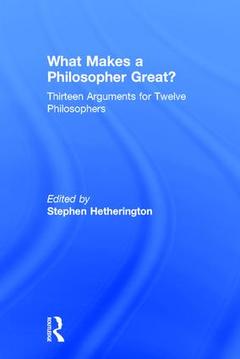What Makes a Philosopher Great? Thirteen Arguments for Twelve Philosophers
Coordonnateur : Hetherington Stephen

This book is inspired by a single powerful question. What is it to be great as a philosopher? No single grand answer is presumed to be possible; instead, rewardingly close studies of philosophical greatness are developed. This is a scholarly yet accessible volume, blending metaphilosophy with the long history of philosophy and traversing centuries and continents. The result is a series of case studies by accomplished scholars, each chapter trying to understand and convey a particular philosopher?s greatness:
Lloyd P. Gerson on Plato
Karyn Lai on Zhuangzi
David Bronstein on Aristotle
Jonardon Ganeri on Buddhaghosa
Jeffrey Hause on Aquinas
Gary Hatfield on Descartes
Karen Detlefsen on du Châtelet
Don Garrett on Hume
Allen Wood on Kant (as a moral philosopher)
Nicholas F. Stang on Kant (as a metaphysician)
Ken Gemes on Nietzsche
Cheryl Misak on Peirce
David Macarthur on Wittgenstein
This also serves a larger philosophical purpose. Might we gain increased clarity about what philosophy is in the first place? After all, in practice we individuate philosophy partly through its greatest practitioners? greatest contributions.
The book does not discuss every philosopher who has been regarded as great. The point is not to offer a definitive list of The Great Philosophers, but, rather, to learn something about what great philosophy is and might be, from illuminated examples of past greatness.
CONTENTS
Preface and acknowledgements
List of contributors
- Philosophical greatness: Introducing the very idea
- Plato, Platonism, and the history of philosophy
- Zhuangzi’s suggestiveness: Sceptical questions
- Aristotle as systematic philosopher: Essence, necessity, and explanation in theory and practice
- Attention to greatness: Buddhaghosa
- Aquinas’s complex web
- Descartes as a great philosopher: Comprehensive physics, mechanistic embodiment, and methodological systematicity
- Émilie du Châtelet on women’s minds and education
- What’s so great about Hume?
- Is Kant a great moral philosopher?
- ‘How is metaphysics possible?’ Kant’s great question and his great answer
- Nietzsche: This time it’s personal
- What makes Peirce a great philosopher?
- Wittgenstein’s un-ruley solution to the problem of philosophy
Stephen Hetherington
Lloyd P. Gerson
Karyn Lai
David Bronstein
Jonardon Ganeri
Jeffrey Hause
Gary Hatfield
Karen Detlefsen
Don Garrett
Allen Wood
Nicholas F. Stang
Ken Gemes
Cheryl Misak
David Macarthur
Stephen Hetherington is Professor of Philosophy at the University of New South Wales. His publications include Epistemology’s Paradox (1992), Good Knowledge, Bad Knowledge (2001), How to Know (2011), and Knowledge and the Gettier Problem (2016).
Date de parution : 11-2017
15.2x22.9 cm
Date de parution : 11-2017
15.2x22.9 cm
Thèmes de What Makes a Philosopher Great? :
Mots-clés :
Popular Science Monthly; Popular Science; philosophers; Hume’s Inductive Skepticism; greatness; Moore’s Propositions; infused; Posterior Analytics Aristotle; virtue; Intentional Species; Lloyd P; Gerson; Closed Plane Figures; Karyn Lai; Philosopher’s Greatness; David Bronstein; Infinite Divisibility; Jonardon Ganeri; Immaterial Entities; Jeffrey Hause; Infused Virtue; Gary Hatfield; Vincent Van Gogh; Karen Detlefsen; Great Moral Philosopher; Don Garrett; Gm Preface; Allen Wood; Kant’s Question; Nicholas F; Stang; Young Men; Ken Gemes; Empirical Deduction; Cheryl Misak; Aristotle’s Commitment; David Macarthur; White Head; Bell Stands; Nelson Mandela; Summa Theologiae; Vice Versa; Constant Conjunction; Indefinite Dyad



